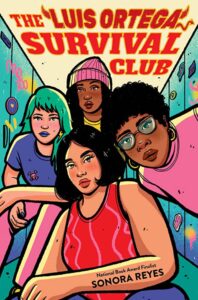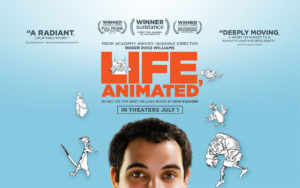
The Luis Ortega Survival Club by Sonora Reyes,
Balzer + Bray, 2023.
Content note: sexual assault; exploitation of the vulnerabilities of women, autistic people, and people of color; victims being unheard.
The Luis Ortega Survival Club is a serious and important novel that is also a compelling read with moments of humor and joy appropriately mixed in. It is marketed as a YA novel and I am reviewing it as a 56-year-old Autistic adult. It is a novel almost entirely about women of color (I noticed only one white character in the story) and I am a white, transmasculine, non-binary person. So I will start by apologizing for my inevitable oversights as a person outside the demographics of the novel and its intended readers.
As a writer and an Autistic reviewer, I read fiction on multiple levels and I will review this novel the same way. This review will address the questions: Is The Luis Ortega Survival Club a good novel? Is the Autistic character good representation? Is this novel politically and/or socially important?
This is a very well-written novel. The plotting is tight and the twists the story took were not predictable. I found myself 3/4 of the way through this novel, still feeling anxious: would the villain get what was coming to him? It really wasn’t clear if, or even how, the novel could have a satisfying ending because Reyes kept the story moving and turning throughout. Yes, the ending was satisfying! (No spoilers!) It tied all the story threads together and there was enough foreshadowing for the ending to make sense and not feel like it came out of nowhere.
There were only two spots where I felt pulled out of the story for a moment: one was when the protagonist used the more medical sounding phrase “self stimulatory behavior” before shortening it to the more common “stim”. It pulled me out of the story because it didn’t feel as accurate to how autistic people tend to talk about stimming. If the full medical term gets used, it happens second, in the explanation of what a “stim” is.
The other spot where my head was pulled out of the story is during a serious conversation between Ariana and her parents. It was a great conversation, it just felt too “easy” for me. (This could be a generational thing. My parents were members of the “Silent Generation” but Ariana’s parents are more likely “Generation X” or even older members of the “Millennial” generation.) I can’t say more about that conversation, because it would require spoilers, but I will say that even though I couldn’t relate to parents sharing with their teen child on such a deep level, I was still emotionally moved and I found the content of the conversation believable.
Other than those two, minor moments, the book COMPLETELY captivated me, pulling me in and through a story that felt very real. In some places, a little bit too real, considering the subject matter. I survived my own “Luis Ortega” so this story was personally affecting for me in that respect.
Luis Ortega is a predatorial high school boy. He targets high school girls and non-binary students assigned female for sexual encounters that range from highly pressured (which is to say, non-consensual) to outright r*pe. The novel opens with Ariana struggling to cope with the aftermath of her own encounter with Luis Ortega. Reyes writes this difficult story with great sensitivity: we know what Luis did but we never have to watch him in action. The novel is intense enough as it is. Showing the assaults in any kind of detail might have made the book too emotionally gutting to read. Reyes writes the topic of teen sexual assault with a delicate touch, deft, and professional. Is this book triggering? Oh, yes. Is it manageable? Also yes.
Ariana is a bisexual Latinx teen girl with situational mutism. She has no formal diagnosis but has identified herself as Autistic. This fact alone is realistic and politically important: as a girl and as a person of color, a formal autism diagnosis is much less accessible to her. Sonora Reyes, the author, has disclosed their own autism online (when I searched to see if Reyes were Autistic, I was delighted to find their disclosure on Twitter as part of a terrific thread about why Reyes identifies Zuko, from Avatar the Last Airbender, as Autistic.)
Ariana is a classic “unreliable narrator”: from the beginning, we, the readers, are far more angry and outraged than Ariana, who seems more confused and hurt than anything. Throughout the story, Ariana very believably misjudges others, thinking people are friends who clearly aren’t Ariana’s friends, while feeling unsure about people who clearly are her friends. I felt like this made me root more strongly for Ariana to find her way through the emotional and social maze she was stuck in.
Ariana is a strong character with a lot of personal power waiting for her to discover and tap into. The friend circle she develops as the story progresses is filled with equally strong characters I felt invested in. I wholeheartedly recommend The Luis Ortega Survival Club as a novel you won’t want to put down.
I am overjoyed by the autistic representation in this novel. Ariana is believable as an autistic young woman who has managed to fall through enough cracks to be in regular education, making above average grades, and not speaking at school. Because she wasn’t a behavior problem and her grades were exceptional, Ariana could have just gotten passed along through a system where it was clear that an evaluation might find “something” but no one put in the extra work to get her an evaluation because she was doing the work and doing it well. An evaluation would have cost more money, more time, more resources. Her quiet focus on schoolwork meant the system could leave her alone and focus its spotlight on other students who were causing problems or failing academically.
As narrator, Ariana was able to normalize her autistic traits for the reader. Showing us the contents of her mind on every page helps the reader to associate her articulate thoughts with her silent presentation, giving us the unwritten message that we should not judge the depth of another’s mind by the loudness of their speech. The combination of deep insight and social naiveté Ariana demonstrates reminds the reader not to judge people’s understanding based on one realm: someone can be both insightful and naive at the same time (and we Autistic folks often are). Ariana is an example of why concepts like functioning levels and IQ are pointless (and often harmful) pigeonholing of complex human beings.
Politically, The Luis Ortega Survival Club is an important novel, both for autistic representation and for bringing more awareness to the #metoo movement and how necessary it is to keep that movement alive. Reyes’ novel shows us what predatory assault looks like in one setting — a high school — and shows the traumatic effects one person can have on a community. Reyes even brings generational experiences of trauma into the story, making it clear how important it is for all of us to prevent and address assault. Reyes’ story shows how sexual assault affects far more than the individual victims of the assault. Trauma has ripples that touch every single person in a community. No one is left untouched and Reyes’ novel is important for showing that fact without preaching or spoon feeding readers.
The Luis Ortega Survival Club shows a mostly non-speaking autistic character taking charge of her life and acting with agency and autonomy. This novel is not fairy-tale autism like some representations I’ve seen on television. Ariana does not have “autistic super powers” and she isn’t doing anything that leaves the reader shaking their head and thinking “this could never happen in the real world.” Ariana, her thoughts, her choices, her actions, the effects of her actions — all of it is believable and real and very possible in the world outside the novel. That is politically powerful storytelling that has the potential to shift how readers view autism and Autistic people.
Finally, this novel is politically important because it centers Latinx people and culture. Many people from others cultures will read The Luis Ortega Survival Club and learn more about life in Latinx families. As a white reader, I was grateful to learn more about the food and feelings, celebrations and beliefs of the characters.
I grew up in an era where most of the stories available for me to read were about abled, cishet, white people. People of color either didn’t exist, or were minor characters, often servants or slaves. Disabled people were plot devices and objects of pity. Queer people were too scandalous to mention. Growing up with those sorts of novels led me to have skewed, unhealthy ideas of what the world was really like.
I am grateful for novels that center people who are different from me so I can continue to work on opening my worldview. I am grateful that Latinx teens and Queer teens have novels to read about people like them. (I wish I’d had novels with Queer characters to read as an isolated and alienated Queer teen!) I am grateful that the generations coming up are reading novels filled with Queer, BIPOC, Disabled characters. Novels that normalize the diversity of the real world are politically important and The Luis Ortega Survival Club is terrific in that aspect.
I recommend this book as a great read, great autistic representation, and a politically important read. Not only is it a wonderful YA coming of age novel, but it’s a story that readers of all ages can enjoy (if I may use such a pleasant word for a story with such troubling elements) and learn from. The subject matter is difficult, but the treatment is welcoming toward the reader, helping us read about trauma without feeling weighted down or hopeless. This is a positive and empowering novel and I’m glad I read it. I hope you will read it, too.


Recent Comments